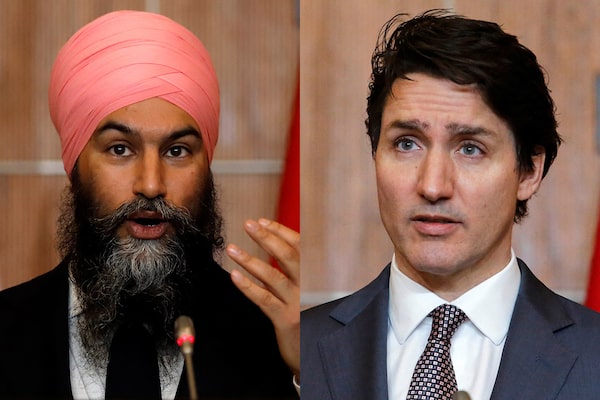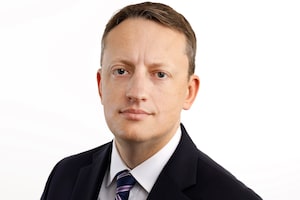
New Democratic Party leader Jagmeet Singh and Prime Minister Justin Trudeau speak at their separate press conferences in Ottawa, March 22, 2022.Patrick Doyle/Reuters
The New Democrats say they won’t stand in the way of higher military spending to confront the Russian threat as long as Prime Minister Justin Trudeau approves billions of dollars in new social programs as part of a deal to prop up the minority Liberal government until June, 2025.
Mr. Trudeau flew to Brussels on Tuesday evening for a special NATO leaders summit on Ukraine, and is under pressure from Western allies to boost defence spending significantly in the federal budget expected in April. Other NATO allies, such as Germany, Denmark and the United Kingdom, have vowed to increase spending on new weapons, equipment and fighter jets to counter Russian aggression.
Before Mr. Trudeau left for Brussels, he and NDP leader Jagmeet Singh held separate news conferences to announce the deal to keep the Liberals in power for the next three years in exchange for parliamentary co-operation and progress on key NDP policies, including an income-based dental care program, national pharmacare and issues such as housing and climate change.
The text of the agreement is silent on defence at a time when Canada is under international pressure to fulfill a long-time pledge to boost military spending to 2 per cent of its GDP, a request from NATO Secretary-General Jens Stoltenberg to counter the increasing global threat of Russian aggression.
What is the Liberal-NDP deal? The supply-and-confidence agreement explained
Mr. Trudeau said the deal does not preclude increasing defence spending. Mr. Singh said his party would not block purchases of new equipment for the Canadian Armed Forces in the upcoming federal budget, provided it does not come at the expense of the billions in new social spending in areas such as health and dental care that are promised in Tuesday’s deal.
Defence Minister Anita Anand has said she has put forward aggressive options for the budget, including the requested increase in military spending to 2 per cent of GDP from the current level of 1.39 per cent.
Mr. Singh said on Tuesday he doesn’t think Canada should aim for 2 per cent. But he also suggested the NDP would not oppose it as long as the Liberals deliver on their pledges to his party.
“They should be able to have the equipment to do the work we ask of them and that’s important,” he said, in reference to the Canadian Forces. “But we’ve made it really clear. The priority that we have is health care. … No decision in the budget should end up impacting our commitments to get people the care they need to take care of their teeth, the care they need to be able to see a doctor or to go to the hospital.”
The Bloc Québécois has said it won’t oppose defence spending, and the Conservatives are on record favouring a military buildup in the face of Russia’s actions in Ukraine.
Canadian Chamber of Commerce president Perrin Beatty said Russia’s invasion has made increased defence a necessity, but he expressed concern about new social spending and urged Ottawa to focus on economic growth in this year’s budget.
“We can’t afford everything. It is going to be critical to have a strategy to grow the economy instead of growing the debt. It isn’t going to come by simply writing more government cheques,” he said, adding that Ottawa also needs to rethink its energy policies as demand increases in Europe for non-Russian oil and natural gas.
The Liberal-NDP pact commits the New Democrats to support budget bills and to vote with the government on any non-confidence motions that could lead to a general election. The two parties have also agreed to control parliamentary committees, which would prevent the Conservatives and the Bloc from launching inquiries that “cause unnecessary obstruction” for the Trudeau minority government.
“The government can function with predictability and stability, present and implement budgets and get things done for Canadians,” Mr. Trudeau said in announcing the deal.
The government has promised to consult the NDP on legislation, and to make senior public servants available for briefings on policy and legislation.
The Liberals and NDP had discussed an informal alliance after the fall election, and those talks resumed in January after Mr. Trudeau called Mr. Singh to congratulate him on the birth of his daughter. Three sources said Mr. Trudeau complained about the toxic atmosphere in the previous Parliament and the inability to get legislation passed. But the secret negotiations took off only after the truckers’ protests and the economic uncertainty from rising inflation and the invasion of Ukraine. Both sides agreed the country needed a stable Parliament without the threat of an early election, the sources said.
Mr. Trudeau’s chief of staff, Katie Telford, and senior adviser Jeremy Broadhurst, who is chief of staff to Deputy Prime Minister Chrystia Freeland, began serious negotiations with the NDP Leader’s chief of staff, Jennifer Howard, and Anne McGrath, the party’s national director. The final deal was hammered out by the two leaders and approved on Monday night, when both Liberal and NDP caucuses signed on, according to the sources.
The Globe and Mail is not identifying the sources because they were not authorized to discuss the private talks.
The NDP’s deal to back the minority Liberal government until 2025 in exchange for progress on key policies could have far-reaching implications. Columnist John Ibbitson says the deal puts pressure on the Liberals to deliver on issues like dental and Pharmacare, but means that Jagmeet Singh is acknowledging he may never be Prime Minister and that the NDP has accepted its role as the conscience of Parliament.
The Globe and Mail
Ms. McGrath said on Tuesday the precipitating factors for the agreement included the pandemic, divisions manifested by the convoy protests and blockades, anxiety over the cost of living and the invasion of Ukraine.
At his news conference, Mr. Singh described the deal as a starting point and said his caucus will push for additional polices. He also stressed that his party retains the right to pull its support.
“If they fall short on what we’ve agreed to, then the deal doesn’t continue. That’s why we’ve got this deal in front of us,” he said. “But I’m going into this with a strong conviction that we can get this done.”
One of the key parts is a dental care program for low-income Canadians, beginning this year for children under 12 years old. It would be expanded to people under 18, seniors and people with disabilities in 2023, and fully implemented in 2024 for families with incomes under $90,000.
Mr. Trudeau outlined several areas of policy focus in the deal, including pharmacare, climate change and Indigenous reconciliation. Ottawa will also proceed with its campaign promise to tax big banks and financial institutions, an idea strongly supported by New Democrats.
An NDP motion calling for the tax hike to be expanded to oil companies and big box store operators was defeated on Tuesday after Liberal MPs abstained during the vote.
Interim Conservative Leader Candice Bergen said the deal means Canada won’t be able to build pipelines and liquefied natural gas facilities at a time when Europe is looking for secure supplies.
Ms. Bergen said the cost of dental care and pharmacare and other measures will lead to runaway federal spending.
“It will mean more debt, more inflation, more jobs lost, more uncertainty and, frankly, more polarization,” she said. Ms. Bergen and her Conservative caucus loudly mocked the agreement in the House of Commons, directing their questions to the “NDP-Liberal government” and asking Mr. Trudeau to put a price tag on his “backroom deal.”
Bloc Leader Yves-François Blanchet called Mr. Singh naive, saying the deal will weaken the NDP, and maintained the Liberals can’t be trusted to keep the agreement until 2025.
“I don’t know what will be left of the NDP in 2025,” he said. “If the Liberal Party sees a window to trigger an election that will give them a majority – if there is a lot of division within the Conservative Party – they will certainly throw the NDP under the bus.” Bloc MPs also warned the deal encroaches on clear areas of provincial jurisdiction and will not be welcome in Quebec.
The deal will run until June, 2025, and cover a period of four government budgets. It says the parties agree to a guiding principle of “no surprises,” suggesting the government will inform the NDP of major upcoming developments.
In terms of formal co-operation, Mr. Trudeau and Mr. Singh are committed to meet at least once per quarter and the party House officers will meet regularly. An oversight group of staff and politicians will also hold a monthly meeting to take stock of progress.
With respect to policy, the agreement promises a Canada Pharmacare Act by 2023, working with the provinces on “additional ongoing investments” for health care, and a Safe Long-Term Care Act “to ensure that seniors are guaranteed the care they deserve, no matter where they live.”
Areas of common ground in housing policy, child care, climate change, Indigenous reconciliation and taxation are all mentioned in the deal.
There is a pledge to introduce legislation by the end of 2023 to prohibit the use of replacement workers, called “scabs” in the agreement, when a union employer in a federally regulated industry has locked out employees or is in a strike.
The two parties also agreed to expand election days to cover three days of voting, and improve mail-in voting, and pledge that Quebec’s number of seats in the House of Commons will remain constant.
For subscribers: Get exclusive political news and analysis by signing up for the Politics Briefing.
 Robert Fife
Robert Fife Bill Curry
Bill Curry Kristy Kirkup
Kristy Kirkup